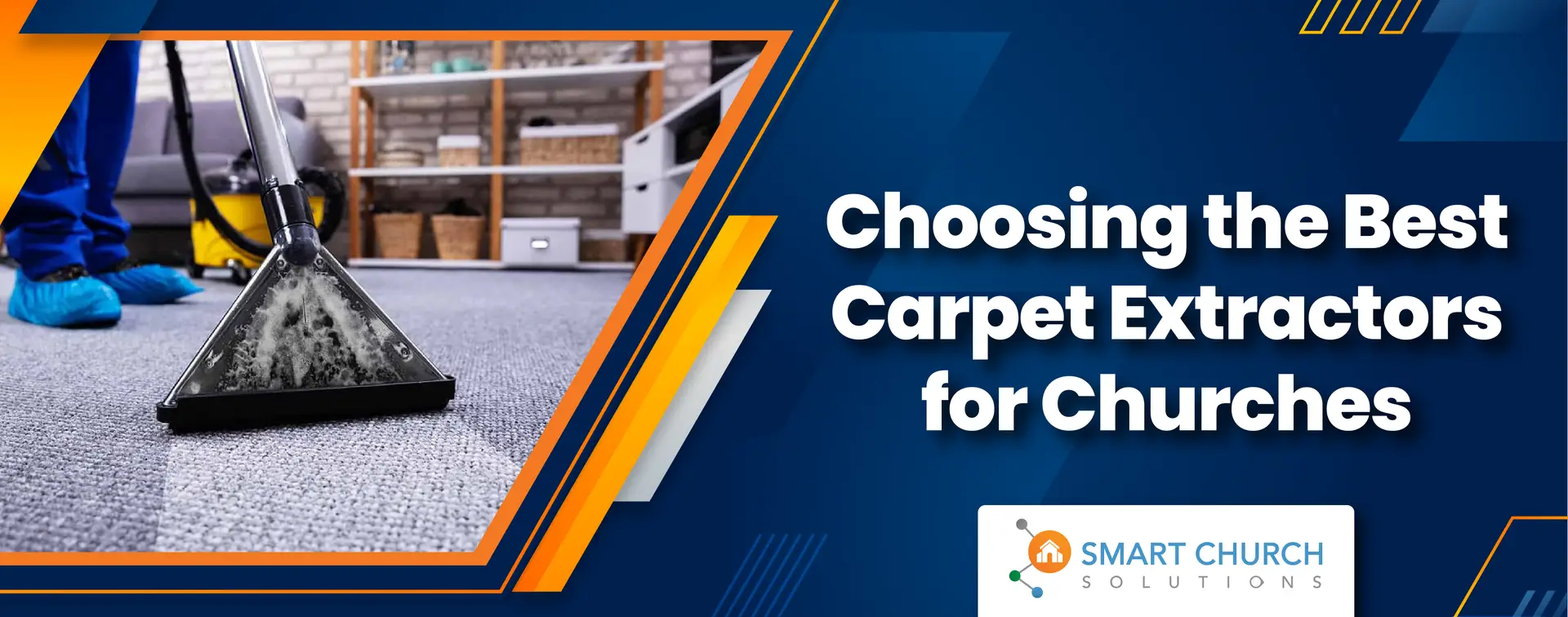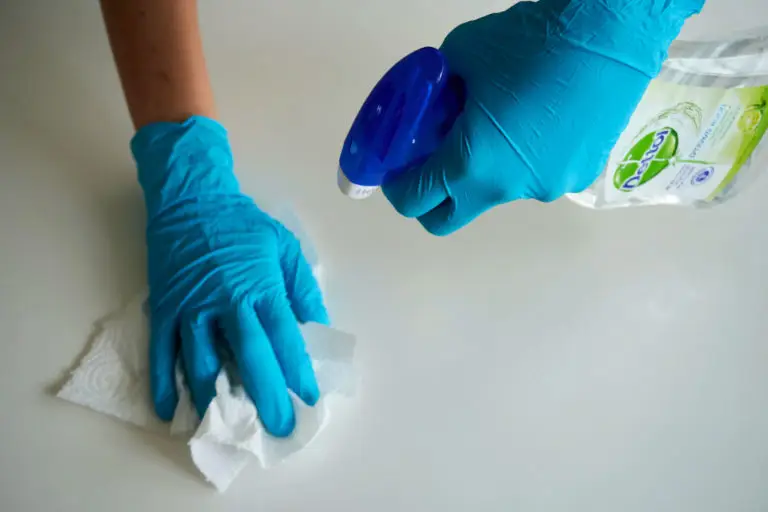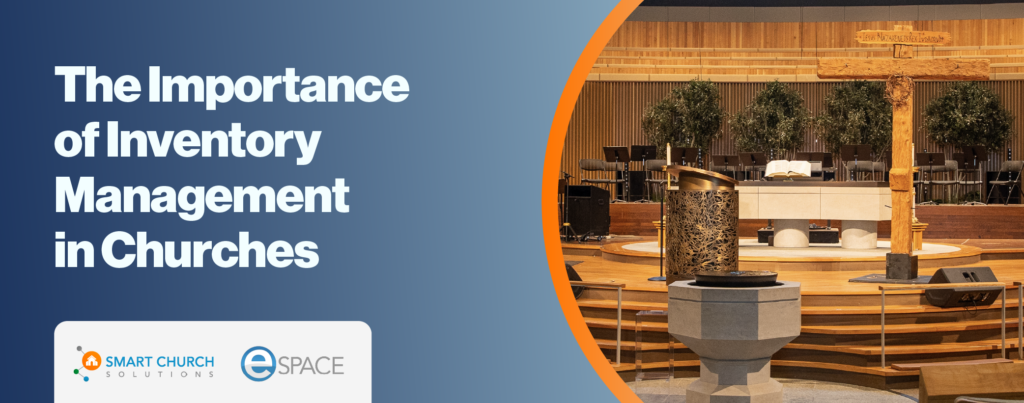Church carpets endure heavy foot traffic, spills, and stains, necessitating regular deep cleaning to maintain a welcoming atmosphere. But there’s a solution: a carpet extractor.
The right carpet extractor can transform the daunting cleanup task into a manageable part of your church’s maintenance routine. Therefore, in the following paragraphs, we will discuss the types of carpet extractors and provide practical advice to help you find the best fit for your church.
The Spectrum of Carpet Extractors
Homeowner-Level Extractors
The market offers a range of homeowner-level carpet extractors designed for light use, such as cleaning up spills or pet messes. While these units are more affordable and readily available at retail stores, their durability and effectiveness are limited in a church setting, where the carpets may cover extensive areas and require more frequent cleaning.
Commercial-Grade Extractors
Commercial-grade extractors are a step up, built to withstand more rigorous use. They resemble their homeowner counterparts in functionality but feature stronger motors and enhanced durability. Brands like Bissell and Hoover offer commercial versions of their products, capable of cleaning larger areas like foyers or small chapels. These machines balance power and manageability, making them suitable for churches that handle their carpet cleaning in-house.
Industrial Carpet Extractors
At the high end of the spectrum are industrial carpet extractors, such as those offered by Nilfisk, a renowned brand in the cleaning equipment industry. These machines, comparable in size to walk-behind floor scrubbers, are designed for large-scale operations and are equipped with features catering to extensive carpet cleaning requirements. Nilfisk’s range of industrial carpet extractors stands out for their durability, efficiency, and advanced technology, making them ideal for churches with significant carpeted areas and the personnel to operate such sophisticated equipment.
However, investing in industrial carpet extractors involves considerations beyond the initial purchase price. Their cost, storage requirements, and maintenance complexity can pose challenges for smaller congregations or those with limited storage space. For these settings, the robustness and longevity of the equipment may represent a long-term saving, provided the church can accommodate these machines both financially and spatially.
Investing in industrial-grade equipment—like carpet extractors—ensures that you have the power and capacity to maintain clean carpets even in the most demanding church environments. However, it’s essential to weigh the benefits against your congregation’s specific needs, resources, and capabilities to make the most informed decision.
Practical Considerations for Church Facilities
Staffing and Maintenance
The effectiveness of a carpet extractor in a church context heavily depends on your facility’s capacity to operate, maintain, and store the equipment. For many churches, compact commercial-grade extractors represent the best compromise. These machines are easier to handle and store, making them ideal for facilities with limited staff. Regular maintenance and cleaning of the machine are crucial to ensure longevity and performance.
Outsourcing vs. In-House Cleaning
Churches with extensive carpeted areas might find that the investment of industrial extractors is not justifiable when considering the purchase cost, maintenance, and staffing. In such cases, outsourcing to professional carpet cleaning services could be more cost-effective and efficient. This approach allows churches to benefit from high-quality cleaning without the logistical challenges of owning and maintaining large equipment.
A Diverse Perspective on Carpet Care
The Case for In-House Equipment
For larger congregations with sufficient budgets and personnel, owning and maintaining high-grade carpet cleaning equipment can be worthwhile. Access to resources, such as equipment training and maintenance guides, can empower church facility stewards to handle repairs and upkeep internally, minimizing downtime and extending the lifespan of their machines.
Pre-Cleaning Necessities
Effective carpet extraction starts long before the machine is powered on. Regular vacuuming with high-quality vacuums is essential to remove surface dirt and debris. Additionally, maintaining clean entrance mats can significantly reduce the amount of dirt reaching your carpets. This pre-cleaning step ensures that carpet extractors can focus on deep cleaning rather than removing surface dirt, improving overall efficiency.
What About Encapsulation or VLM Equipment?
When contemplating the integration of encapsulation chemicals and processes into church maintenance routines, several institutional characteristics must be considered. Churches often operate with smaller staffs, which can affect their ability to adopt and effectively use advanced cleaning technologies. The crucial initial steps in the encapsulation process involve accurate chemical application and thorough mechanical agitation; if not executed properly, the expected cleaning results may not be achieved. Furthermore, churches may face practical challenges when using heavy-duty equipment, such as large extractors, due to insufficient training, limited storage, and the need for space to dry without disrupting activities.
For most churches, especially those under 40,000 square feet, simpler solutions like the commercial Bissell line provide a more feasible option for handling daily cleaning tasks and spot extractions. These smaller machines are not only more cost-effective but are also easier to use and maintain, offering better return on investment for churches not staffed to perform extensive cleaning procedures. In larger spaces, outsourcing to professional services for comprehensive carpet cleaning can be more advantageous and efficient. Additionally, employing straightforward, minimal-equipment methods, such as using diatomaceous earth with a pole-mounted brush for spot cleaning, can be effective. However, any chosen process or equipment must meet three critical criteria: it should be simple (logical and manageable), sustainable (usable long-term), and reproducible (teachable across staff).
Additional Practical Tips
Assigning Equipment Caretakers
Designating specific staff members as caretakers for each piece of cleaning equipment ensures that machines are properly used, cleaned, and stored. This approach can prevent common issues like clogged filters or damaged parts, which can sideline equipment and interrupt your cleaning schedule.
Evaluating Building Usage and Flooring Composition
The church’s layout and the events it hosts will influence your carpet cleaning needs. Churches with fixed seating or special flooring materials may require specific cleaning strategies. Additionally, consider the frequency of use and the types of activities hosted in your space to determine the level of cleaning needed and the best type of extractor to meet those needs.
Conclusion: Making the Right Choice for Your Church
Finding the ideal carpet extractor for your church is a decision that impacts not only the cleanliness of your space but also the efficiency of your maintenance routines. By carefully considering your church’s size, staffing capabilities, and the extent of your carpeted areas, you can select a carpet extractor that offers the best blend of functionality, ease of use, and cost-effectiveness.
Bottom line: The goal here is to ensure that your church remains a clean, welcoming space for all who enter, and choosing the right carpet extractor is a crucial step in achieving that mission.








